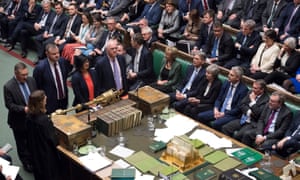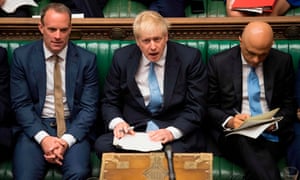MPs can still thwart Boris Johnson over no deal. Here’s how
There are five scenarios in which crashing out of the EU can be prevented. But it will be a herculean task
Can parliament prevent a no-deal Brexit? There may well be a majority in the Commons against it. But Dominic Cummings, Boris Johnson’s special adviser, says it is too late.
For Brexit is currently the default position. In February 2017, the Commons passed the European Union (Notification of Withdrawal) Act by a vote of 494 to 122 – a majority of 372 – empowering the government to implement the decision of the 2016 referendum. The EU was told that, under article 50 of the Lisbon treaty the UK would withdraw by 29 March 2019. This has been put back by two extensions to 31 October, but Johnson has insisted that, come hell or high water, there will be no further extensions.
Cummings believes there is now no time to reverse parliament’s decision. The Commons does not return from its summer break until 3 September, just eight weeks before Brexitday. Standing order 13 provides that only the government can seek an early recall.
Is Cummings right? Not necessarily, but proving him wrong will be a herculean task for backbench MPs navigating uncharted constitutional waters. A no-deal Brexit can be prevented only by legislation, not by a mere expression of parliamentary opinion, nor by a motion. Neitherof these has any legal effect. But there are, in theory, five ways in which the Commons could act.
First, it could legislate to require the prime minister to seek a further extension. The EU27 would then have to decide by unanimity whether to grant it, and under what conditions.
Second, it could legislate to prevent the government from leaving without a deal. But that would in effect repeal the act withdrawing Britain from the EU, since if the Commons were then to reject every deal put to it, the UK would remain in the EU ad infinitum.
Third, the Commons could legislate for a referendum before Brexit.
Fourth, it could legislate to repeal the European Union (Notification of Withdrawal) Act and reinstate the European Communities Act, in which case the UK would remain in the EU.
Finally, the Commons could vote no confidence in the government. There might then be either an alternative government prepared to delay or prevent Brexit or a general election.
How plausible are these scenarios? Of the five, all but the last require the Commons to take control of the legislative process. That could be achieved by the Commons agreeing to suspend standing order 14, which gives priority to government business. In April the Cooper-Letwin bill, which passed third reading by one vote, did precisely that, requiring Theresa May to seek an extension to the Brexit date to avoid a no-deal Brexit.
But any legislation designed to postpone or prevent Brexit has public spending implications. For were the UK to stay in the EU beyond 31 October it would have to make further budget contributions. But standing order 48 requires any charge on public revenue to be recommended by the crown, which, for practical purposes, means a government minister responsible to parliament and through parliament to the people, not backbenchers. So that standing order too would have to be suspended.
The practical difficulties would be enormous. Backbenchers would have to steer the relevant legislation through all of its stages in the Commons, and deal with a host of amendments in committee together with endless filibustering by enraged Brexiteers.
If backbenchers were to succeed in taking over the legislative timetable, they would in effect be taking over the functions of government. Logic surely requires that they themselves become the government. That would require a no-confidence vote in which enough Conservatives would have to abstain or vote against the government to counter Labour Brexiteers prepared to abstain or vote with the government. But a no-confidence vote can only be moved by the leader of the opposition, Jeremy Corbyn.
A successful no-confidence vote does not mean, as would have been the case before the Fixed-term Parliaments Act 2011, an immediate dissolution. Instead, there is a 14-day window in which to find an alternative government capable of securing the confidence of the Commons. A Corbyn government would be unlikely to secure that confidence. Conservatives, the DUP and Liberal Democrats would vote against it. Another possibility, however, would be a government of national unity to forestall Brexit, led perhaps by someone such as Yvette Cooper or Keir Starmer.
Normally when a government resigns the Queen would send for the leader of the opposition. To depart from accepted practice, she would need a cast-iron guarantee in writing from a majority of MPs that they would support a government of national unity under a named prime minister.
The alternative is a general election, which would inevitably take on the character of a second referendum. The election would be called by the prime minister following the closure of the 14-day window. After dissolution there must be 25 working days before the election. So if a vote of no-confidence took place on 5 September it could be held on 17 October just in time for the new parliament to prevent a no-deal Brexit.
The trouble is that dissolution need not follow immediately after the 14-day window closes. Under section 2 (7) of the Fixed-term Parliaments Act it is for the prime minister to recommend a suitable election date to the Queen. Only when he has done so is the date of dissolution determined. Were Johnson to delay the election date beyond 31 October he would be accused of acting unconstitutionally, but it would not be unlawful.
The caretaker convention dictates that no alteration of policy should occur during the pre-election period. Suppose the Commons had clearly indicated that it was opposed to a no-deal Brexit. How should the convention then be interpreted? Constitutionally, there is no clear answer. The logic of democracy suggests that the people should decide.
• Vernon Bogdanor is professor of government at King’s College, London, and author of Beyond Brexit



Geen opmerkingen:
Een reactie posten
Opmerking: Alleen leden van deze blog kunnen een reactie posten.